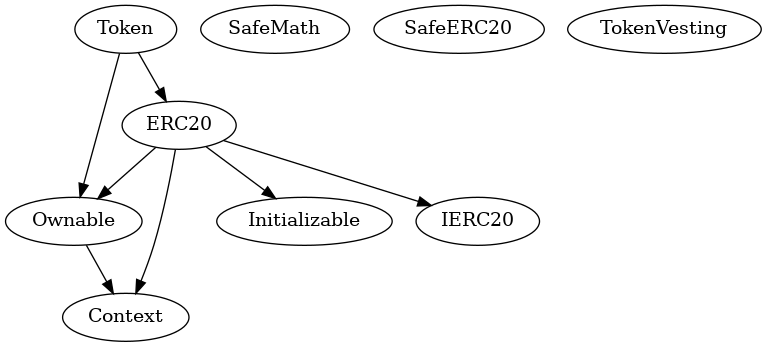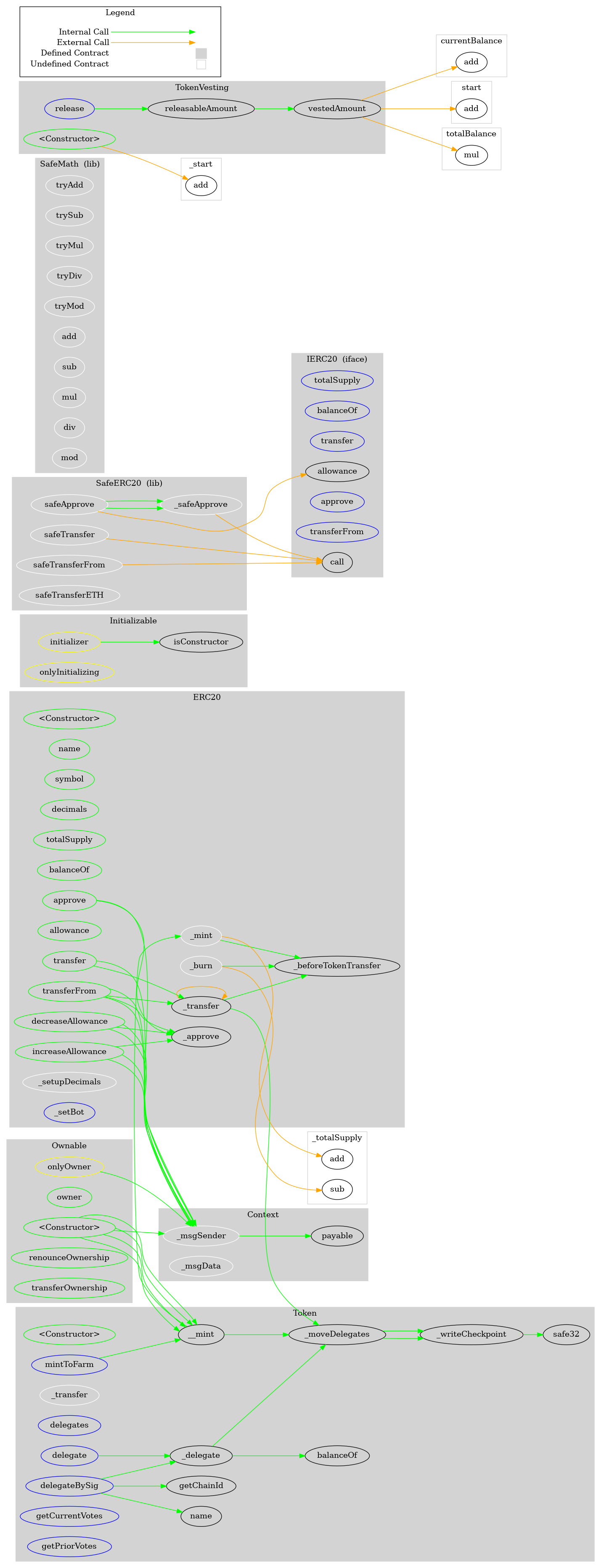Vacus Finance
Smart Contract Audit Report
Audit Summary
 Vacus Finance is building a new ERC-20 token and a token vesting mechanism on Avalanche.
Vacus Finance is building a new ERC-20 token and a token vesting mechanism on Avalanche.
For this audit, we reviewed the project team's Token and TokenVesting contracts at 0xF6557bC62AC67744961479eA6c131B61444714d6 on the Avalanche Mainnet.
Audit Findings
No findings were identified, though some centralized aspects are present.
Date: July 19th, 2022.
Contracts Overview
TokenVesting Contract:Token Contract:
- This contract is used to lock tokens for a specified period of time and vest them to a single beneficiary.
- Any user can begin releasing tokens to the beneficiary once the cliff time of the contract has passed by specifying a token address.
- The beneficiary will receive 100% of the tokens after the duration time has passed since the start time.
- If the duration time has not passed and the beneficiary releases tokens, the number of tokens the beneficiary will receive is proportional to the amount of time that has passed in the vesting schedule.
- The total supply of the token is currently 105 million $VCS [105,000,000].
- The owner can mint 195 million tokens to a specified Farm address one time.
- No burn functions exist, though the circulating supply can be decreased by sending tokens to the 0x..dead address.
- Three TokenVesting contracts were created upon deployment of the Token contract that were each assigned a unique cliff time, start time, and duration.
- The deployer of the Token contract is set as the beneficiary for each contract.
- Any user can begin releasing tokens from the Marketing Lock contract at any time. 100% of the tokens can be released after 300 days.
- Any user can begin releasing tokens from the Community Lock contract after 180 days have passed. 100% of the tokens can be released after 420 days.
- Any user can begin releasing tokens from the Team Lock contract after 180 days have passed. 100% of the tokens can be released after 390 days.
- At the time of writing this report, there are 4 total token holders. The token allocation is as follows:
- 28.57% of the total supply belongs to the owner.
- 28.57% of the total supply belongs to the team's unverified Marketing Lock contract.
- 22.86% of the total supply belongs to the team's unverified Community Lock contract.
- 20% of the total supply belongs to the team's unverified Team Lock contract.
- The $VCS token is designed to be a governance token where one token represents one vote.
- Users may delegate their votes to another address allowing them to vote on behalf of the user.
- Once votes are delegated, the user must explicitly delegate back to themselves to regain their votes.
- Users also have the option to delegate through the use of a signed message, allowing for a gasless delegation for the user.
- The owner can blacklist accounts from being able to initiate transfers.
- The contract complies with the ERC-20 token standard.
- As the contract is deployed with Solidity v0.8.6, it is protected from overflows/underflows.
Audit Results
| Vulnerability Category | Notes | Result |
|---|---|---|
| Arbitrary Jump/Storage Write | N/A | PASS |
| Centralization of Control |
|
WARNING |
| Compiler Issues | N/A | PASS |
| Delegate Call to Untrusted Contract | N/A | PASS |
| Dependence on Predictable Variables | N/A | PASS |
| Ether/Token Theft | N/A | PASS |
| Flash Loans | N/A | PASS |
| Front Running | N/A | PASS |
| Improper Events | N/A | PASS |
| Improper Authorization Scheme | N/A | PASS |
| Integer Over/Underflow | N/A | PASS |
| Logical Issues | N/A | PASS |
| Oracle Issues | N/A | PASS |
| Outdated Compiler Version | N/A | PASS |
| Race Conditions | N/A | PASS |
| Reentrancy | N/A | PASS |
| Signature Issues | N/A | PASS |
| Unbounded Loops | N/A | PASS |
| Unused Code | N/A | PASS |
| Overall Contract Safety | PASS |
Inheritance Chart

Function Graph

Functions Overview
($) = payable function
# = non-constant function
Int = Internal
Ext = External
Pub = Public
+ [Int] IERC20
- [Ext] totalSupply
- [Ext] balanceOf
- [Ext] transfer #
- [Ext] allowance
- [Ext] approve #
- [Ext] transferFrom #
+ Context
- [Int] _msgSender
- [Int] _msgData
+ Ownable (Context)
- [Pub] #
- [Pub] owner
- [Pub] renounceOwnership #
- modifiers: onlyOwner
- [Pub] transferOwnership #
- modifiers: onlyOwner
- [Prv] _setOwner #
+ [Int] IFactory
- [Ext] createPair #
+ [Int] IRouter
- [Ext] factory
- [Ext] WETH
- [Ext] addLiquidityETH ($)
- [Ext] swapExactTokensForETHSupportingFeeOnTransferTokens #
+ KoaCombat (Context, IERC20, Ownable)
- [Pub] #
- [Pub] name
- [Pub] symbol
- [Pub] decimals
- [Pub] totalSupply
- [Pub] balanceOf
- [Pub] transfer #
- [Pub] allowance
- [Pub] approve #
- [Pub] transferFrom #
- [Pub] increaseAllowance #
- [Pub] decreaseAllowance #
- [Pub] isExcludedFromReward
- [Pub] reflectionFromToken
- [Pub] tokenFromReflection
- [Pub] excludeFromReward #
- modifiers: onlyOwner
- [Ext] includeInReward #
- modifiers: onlyOwner
- [Pub] excludeFromFee #
- modifiers: onlyOwner
- [Pub] includeInFee #
- modifiers: onlyOwner
- [Pub] isExcludedFromFee
- [Pub] setTaxes #
- modifiers: onlyOwner
- [Prv] _reflectRfi #
- [Prv] _takeLiquidity #
- [Prv] _takeTreasury #
- [Prv] _takeCharity #
- [Prv] _takeBurn #
- [Prv] _getValues
- [Prv] _getTValues
- [Prv] _getRValues
- [Prv] _getRate
- [Prv] _getCurrentSupply
- [Prv] _approve #
- [Prv] _transfer #
- [Prv] _tokenTransfer #
- [Prv] swapAndLiquify #
- modifiers: lockTheSwap
- [Prv] addLiquidity #
- [Prv] swapTokensForETH #
- [Ext] updateTreasuryWallet #
- modifiers: onlyOwner
- [Ext] updateBurnWallet #
- modifiers: onlyOwner
- [Ext] updateCharityWallet #
- modifiers: onlyOwner
- [Ext] updateLPRecipient #
- modifiers: onlyOwner
- [Ext] updatMaxTxAmt #
- modifiers: onlyOwner
- [Ext] updateSwapTokensAtAmount #
- modifiers: onlyOwner
- [Ext] updateSwapEnabled #
- modifiers: onlyOwner
- [Ext] updateCoolDownSettings #
- modifiers: onlyOwner
- [Ext] setAntibot #
- modifiers: onlyOwner
- [Ext] bulkAntiBot #
- modifiers: onlyOwner
- [Ext] updateRouterAndPair #
- modifiers: onlyOwner
- [Pub] isBot
- [Ext] airdropTokens #
- modifiers: onlyOwner
- [Ext] rescueETH #
- modifiers: onlyOwner
- [Pub] rescueAnyERC20Tokens #
- modifiers: onlyOwner
- [Ext] ($)
About SourceHat
SourceHat has quickly grown to have one of the most experienced and well-equipped smart contract auditing teams in the industry. Our team has conducted 1300+ solidity smart contract audits covering all major project types and protocols, securing a total of over $50 billion U.S. dollars in on-chain value across 1500 projects!.
Our firm is well-reputed in the community and is trusted as a top smart contract auditing company for the review of solidity code, no matter how complex. Our team of experienced solidity smart contract auditors performs audits for tokens, NFTs, crowdsales, marketplaces, gambling games, financial protocols, and more!
Contact us today to get a free quote for a smart contract audit of your project!
What is a SourceHat Audit?
Typically, a smart contract audit is a comprehensive review process designed to discover logical errors, security vulnerabilities, and optimization opportunities within code. A SourceHat Audit takes this a step further by verifying economic logic to ensure the stability of smart contracts and highlighting privileged functionality to create a report that is easy to understand for developers and community members alike.
How Do I Interpret the Findings?
Each of our Findings will be labeled with a Severity level. We always recommend the team resolve High, Medium, and Low severity findings prior to deploying the code to the mainnet. Here is a breakdown on what each Severity level means for the project:
- High severity indicates that the issue puts a large number of users' funds at risk and has a high probability of exploitation, or the smart contract contains serious logical issues which can prevent the code from operating as intended.
- Medium severity issues are those which place at least some users' funds at risk and has a medium to high probability of exploitation.
- Low severity issues have a relatively minor risk association; these issues have a low probability of occurring or may have a minimal impact.
- Informational issues pose no immediate risk, but inform the project team of opportunities for gas optimizations and following smart contract security best practices.
